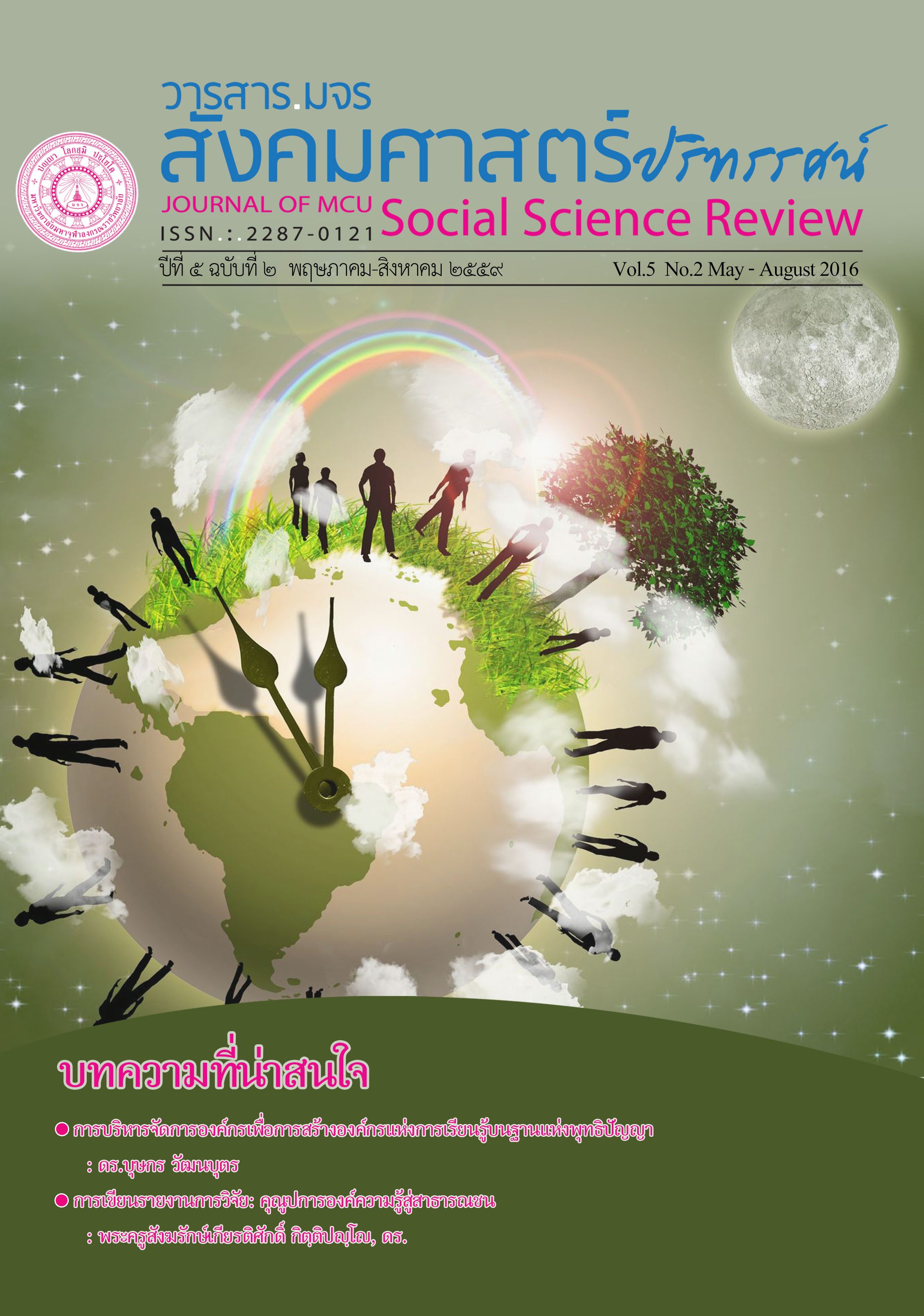รูปแบบการบริหารจัดการศูนย์พัฒนาเด็กเล็กตามหลักพุทธธรรม
คำสำคัญ:
การบริหารจัดการ, ศูนย์พัฒนาเด็กเล็ก, หลักพุทธธรรมบทคัดย่อ
บทความวิจัยนี้มีวัตถุประสงค์เพื่ ๑) ศึกษาวิเคราะห์สภาพทั่วไปและปัญหาอุปสรรคในการจัดรูปแบบการบริหารจัดการศูนย์พัฒนาเด็กเล็ก ๒) ศึกษาการบูรณาการหลักพุทธธรรมในการบริหารจัดการศูนย์พัฒนาเด็กเล็ก แล ๓) น้ำเสนอรูปแบบการบริหารจัดการศูนย์พัฒนาเด็กเล็กตามหลักพุทธธรรม ระเบียบวิธีวิจัยเป็นการวิจัยชิงผสานวิธี ระหว่างการวิจัยเชิงปริมาณและการวิจัยเชิงคุณภาพการวิจัยชิงปริมาณก็บข้อมูลจากกลุ่มตัวอย่าง ๓๗ คน สุ่มตัวอย่างแบบง่ายจากประชาก ๒,๖๓ด คน โดยใช้สูตรของกโร่ ยมาเน่ เครื่องมือเก็บข้อมูล ได้แก่ แบบสอบถามวิเคราะห์ข้อมูลด้วยสถิติพรรณน ได้แก่ ค่ร้อยละ ค่เฉลี่ย และค่าเบี่ยงเบนมาตรฐาน การวิจัยเชิงคุณภาพ ๒ ขั้นตอน ได้แก่ ขั้นตอนที่ ๑ เก็บข้อมูลจากผู้ให้ข้อมูลสำคัญ จำนวน ๒๐ รูป/คน เลือกแบบเจาะจงจากผู้เชี่ยวชาญ ครื่องมือในการเก็บข้อมูล ได้แก่ แบบสัมภาษณ์เชิงลึก เก็บข้อมูลด้วยการสัมภาษณ์แบตัวต่อตัว ขั้นตอนที่ ๒ เก็บข้อมูลจากผู้เชี่ยวชาญที่มีประสบการณ์ตรง จำนวน๒๑ รูป/คน ในกระบวนการเทคนิเดลฟาย จำนวน ๓ รอบ ใช้การวิเคราะห์ทางสถิติโดยใช้ค่ามัธย-ฐาน และค่พิสัยระหว่าควอไทล์ โดยพิจรณาคัดเลือกข้อที่มีค่มัธยฐานตั้งแต่ ๓.๕๐ ขึ้นไป และมีค่าพิสัยระหว่าง ควอไทล์ ๑.๕๐ ลงมา วิเคราะห์ข้อมูลด้วยสถิติพรรณนาผลการวิจัยพบว่า๑) ศูนย์พัฒนาเด็กล็กได้รับการสนับสนุนจากองค์กรปกครองส่วนท้องถิ่น และความร่วมมือสนับสนุนจกประชาชนในการจัดรูปแบบการบริหารจัดการ ประกอบด้วย การวางแผนการจัดกิจกรมประจำวัน การจัดประสบการณ์การเรียนรู้ การส่งเสริมความเป็นกัลยาณมิตรและการบริหารทรัพยกร โดยมีเป้าหมายตามมาตรฐานการดำเนินงานศูนย์พัฒนาเด็กเล็ก และการประกันคุณภาพตามแผพัฒนาการศึกษา ซึ่มีปัญหาอุปสรรคในการบริหารจัดการ ศูนย์พัฒนาเด็กเล็ก คือ งบประมาณไม่เพียพอ โดยปัญหาอุปสรรคดังกล่าวจะได้รับการสนับสนุน การแก้ไบจากองค์กรปกครองส่วนท้องถิ่ และความร่วมมือสนับสนุนจากประชาชนเพื่อจัดรูปแบบการบริหารจัดการศูนย์พัฒนาเด็กเล็กให้ขับเคลื่อนไปยังเป้าหมายที่วางไว้๒) แนวคิด ทฤษฎีและหลักพุทธธรรมในการบริหารจัดการศูนย์พัฒนาเด็กเล็กตามหลักพุทธธรรม ประกอบด้วย แนวคิด ทฤษฎีการวางแผน การจัดการองค์การและบุคลากร ความเป็นผู้นำหลักการประเมินผล สามารถนำมาบูรณาการกับหลักไตรสิกขา ที่ประกอบด้วย หลักศีล หลักสมาธิและหลักปัญญา นำมาประยุกต์ใช้ในกรบริหารจัดการศูนย์พัฒนาเด็กเล็กในด้านกายภาพด้านกิจกรรมพื้นฐานชีวิต ด้านการเรียนการสอน ด้านบรรยากาศและปฏิสัมพันธ์ และด้านการจัดการ จะเกิดการบริหารจัดการศูนย์พัฒนาเด็กเล็กที่มีพฤติกรรมที่ดี จิตใจที่ดีงาม และปัญญาความรู้ ความเข้าใจ อย่างมีเหตุผลตามหลักพุทธธรรม๓) ผู้เชี่ยวชาญเดลฟายมีความเห็นต่อรูปแบบการบริหารจัดการศูนย์พัฒนาเด็กเล็กตามหลักพุทธรรมว่า ควรยกระดับคุณภาพการวางแผนแบบมีส่วนร่วมให้สอดคล้องกับสภาพความเป็นจริง สามารถรับรู้ สัมผัส ปฏิบัติจริง ครอบคลุมกับพัฒนาการด้านร่างกาย อารมณ์ จิตใจ สังคมและสติปัญญา รวมทั้งควรเพิ่มสมรรถนะการจัดการองค์การและบุคลากรด้วยนวัตกรรมที่ทันสมัยให้มีประสิทธิภพ สร้างความเชื่อมั่น ความศรัทธา แรงจูงใจในการมีส่วนร่วมด้วยเทคนิควิธีที่ทันสมัยอย่างเป็นระบ และพัฒนาระบบการประเมินผลให้มีประสิทธิภาพอย่างสมดุล มั่นคง ยั่งยืน และแก้ปัญหาได้จริงตามหลักพุทธธรรม
เอกสารอ้างอิง
สำนักประสานและพัฒนาการจัดการศึกษาท้องถิ่น กรมส่งเสริมการปกครองท้องถิ่น
กระทรวงมหาดไทย. มาตรฐานการดำเนินงานศูนย์พัฒนาเด็กเล็กขององค์กรปกครอง
ส่วนท้องถิ่น. กรุงเทพมหานคร : กรมส่งเสริมการปกครองท้องถิ่น, ๒๕๕๓.
(๒) วารสาร :
ทนงศักดิ์ ปักโคหนัง. "การบริหารจัดการศูนย์พัฒนาเด็กเล็กสังกัดองค์การบริหารส่วนตำบลแกดำ
อำเภอแกดำ จังหวัดมหาสารคาม", การเมืองการปกครอง กิจการสาธารณะ (Public
Affairs), ปีที่ ๔ ฉบับที่ ๒ (มีนาคม-สิงหาคม ๒๕๕๗)
พิพัฒน์ หมาดเม. "แนวทางในการพัฒนาศูนย์พัฒนาเด็กเล็ก ขององค์การบริหารส่วนตำบลเกาะ
กลาง อำเภอเกาะลันตา จังหวัดกระบี่". การประชุมหาดใหญ่วิชาการ. ครั้งที่
(พฤษภาคม ๒๕๕๖) : ๕๑๐.
ผุสดี ศรีเพ็ญ. "สภาพการดำเนินงานศูนย์พัฒนาเด็กเล็กขององค์การบริหารส่วนตำบลท่านั่ง อำเภอ
โพทะเล จังหวัดพิจิตร", เครือข่ายบัณฑิตศึกษามหาวิทยาลัยราชภัฏภาคเหนือ, ปีที่ ๔
ฉบับที่ ๗ (กรกฎาคม-ธันวาคม ๒๕๕๗)
ขวัญชนก กุลชะโมรินทร. "การศึกษาปัญหาและแนวทางการพัฒนาการบริหารจัดการศูนย์พัฒนา
เด็กเล็กในเขตอำเภอสหัสขันธ์ จังหวัดกาฬสินธ์". มหาวิทยาลัยนครพนม, ปีที่ ๔ ฉบับที่ ๑
(มกราคม-เมษายน ๒๕๕๓)
(๓) วิทยานิพนธ์/รายงานการวิจัย :
ฉัตรชัย ธรรมครบุรี. การพัฒนาทรัพยากรมนุษย์ตามแนวพระพุทธศาสนาของโรงเรียนรางวัล
พระราชทาน. วิทยานิพนธ์พุทธศาสตรดุษฎีบัณฑิต สาขาวิชารัฐประศาสนศาสตร์.
บัณฑิตวิทยาลัย : มหาวิทยาลัยมหาจุฬาลงกรณราชวิทยาลัย, ๒๕ ๕๗.
บุษกร วัฒนบุตร. "การนำพุทธญาณวิทย (ตรสิกขา) และตัวแบบการบริหารจัดการ ความรู้และ
ทักษะ (KM) เพื่อสร้างและพัฒนาทุนมนุษย์ ในองค์กรมหาชน". วิทยานิพนธ์รัฐ
ประศาสนศาสตร์ดุษฎีบัณฑิต. บัณฑิตวิทยาลัย มหาวิทยาลัยราชภัฎวไลยอลงกรณ์ ใน
พระบรมราชูปถัมภ์, ๒๕๕๕.
(๔) สื่ออิเล็กทรอนิกส์ :
กรมส่งเสริการปกครองท้องถิ่น. ข้อมูลผู้ดูแลเด็กดีเด่น. [ออนไลน์], แหล่งที่มา :
http://ereport.dla.go.th/teacher.jsp. [ ๑๒ พ.ย.๒๕๕๘]
๒. ภาษาอังกฤษ
(I) Books:
Bateman. Thomas S.& Scott A. Snell. Management : Building Competitive
Advantage. (4thed). Boston : Lrwin McGraw-Hill, 2007.
Certo, Samuetl C, Modern Management. (8th ed). New Jersey : Prentice-Hill, 2008.
Schemerhorn, John R. Jr., Management. (5th ed). USA : John Wiley & Sons, 2009.
ดาวน์โหลด
เผยแพร่แล้ว
รูปแบบการอ้างอิง
ฉบับ
ประเภทบทความ
สัญญาอนุญาต
ลิขสิทธิ์ (c) 2016 วารสาร มจร สังคมศาสตร์ปริทรรศน์

อนุญาตภายใต้เงื่อนไข Creative Commons Attribution-NonCommercial-NoDerivatives 4.0 International License.
เพื่อให้เป็นไปตามกฎหมายลิขสิทธิ์ ผู้นิพนธ์ทุกท่านต้องลงลายมือชื่อในแบบฟอร์มใบมอบลิขสิทธิ์บทความให้แก่วารสารฯ พร้อมกับบทความต้นฉบับที่ได้แก้ไขครั้งสุดท้าย นอกจากนี้ ผู้นิพนธ์ทุกท่านต้องยืนยันว่าบทความต้นฉบับที่ส่งมาตีพิมพ์นั้น ได้ส่งมาตีพิมพ์เฉพาะในวารสาร มจร สังคมศาสตร์ปริทรรศน์ เพียงแห่งเดียวเท่านั้น หากมีการใช้ภาพหรือตารางหรือเนื้อหาอื่นๆ ของผู้นิพนธ์อื่นที่ปรากฏในสิ่งตีพิมพ์อื่นมาแล้ว ผู้นิพนธ์ต้องขออนุญาตเจ้าของลิขสิทธิ์ก่อน พร้อมทั้งแสดงหนังสือที่ได้รับการยินยอมต่อบรรณาธิการ ก่อนที่บทความจะได้รับการตีพิมพ์ หากไม่เป็นไปตามข้อกำหนดเบื้องต้น ทางวารสารจะถอดบทความของท่านออกโดยไม่มีข้อยกเว้นใดๆ ทั้งสิ้น





